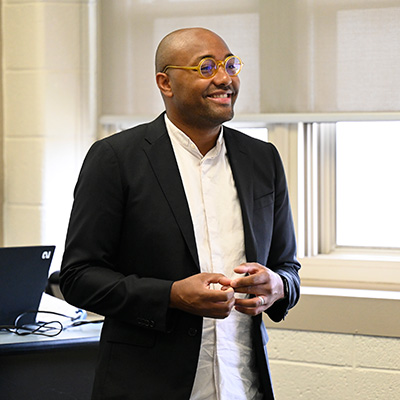Black History Month is a time to celebrate, reflect and connect
 This February, University of Detroit Mercy will give students of all backgrounds a chance to immerse in Black History Month.
This February, University of Detroit Mercy will give students of all backgrounds a chance to immerse in Black History Month.
But Black History Month is much more than any group of events.
“It’s a month for people to reflect on things that weren’t normally talked about in curriculum,” said Justin Williams, associate professor of History and director of the African American Studies Program at Detroit Mercy. “We’re doing a much better job of including stories about Black people in our schooling, but for most American history, Black people just weren’t mentioned in textbooks. The rationale was ‘Let’s talk about Black inventors and Black politicians so children have role models and understand they have a history.’”
Since 1976, Black History Month has been federally recognized to celebrate the culture, hardships and accomplishments that have been made by African Americans in the United States. But it has been celebrated since as early as 1926, when the month of February was chosen to coincide with the birthdays of Frederick Douglass and Abraham Lincoln.
“In fact, if you study Black history earnestly, then you would admire the amount of progress that's been made,” Williams said. “My grandfather would think my life is science fiction. Black history is talking about how America is doing so much better, including Black people and providing upward mobility.”
In addition to being a celebration of progress, Black History Month is also a reminder to stay vigilant and informed about the modern world.
“The fact that we’re in this new era of book bans and attacks on critical race theory…we’re not there yet. People are trying to change the word ‘slave’ in a textbook to ‘worker.’, Williams said. “We still have to teach these things, because if we didn’t insist on a Black History Month, there would be a story about we got a bunch of interns from Africa, and they were super nice. That would literally get taught in schools if Black history organizations weren’t watching these things. It’s why we had to create Black History Month in the first place. I think the future is to keep doing it, but it’s also to keep making it.”
University of Detroit Mercy is embedded in a city with a history deeply entwined with Black history, which provides an exciting opportunity.
“If you’re in the city of Detroit, you have historical, cultural infrastructure. Just interacting with Detroit is Black history,” Williams said. “Go to the Motown Museum, go to the Detroit Institute of Arts, go to the Charles Wright Museum. There’s Black history all over this city.”
And you don’t have to go to a museum to learn about Black history, Williams added.
“That’s a social advantage of living in the Detroit metropolitan area: You can go to a restaurant or a cafe, you can be surrounded by it. Ask people their stories. You’ve got a population here that’s got really deep roots in the Great Migration, or more recently immigration. Listen to people’s relationships with the city. It doesn’t necessarily have to be a political act. Be in somebody else’s environment and hang in and talk with them; that can lead to political changes.”
For those interested in enjoying Black History Month on campus, there are a suite of free programs hosted on both McNichols and Corktown campus throughout the month of February. A detailed list of these activities can be found online.
— By Marketing & Communications student intern James Whitener
